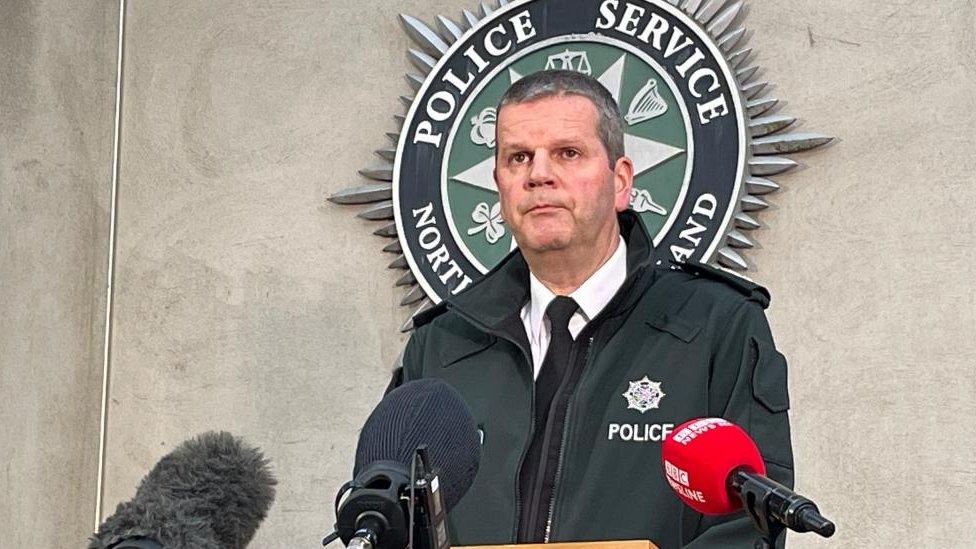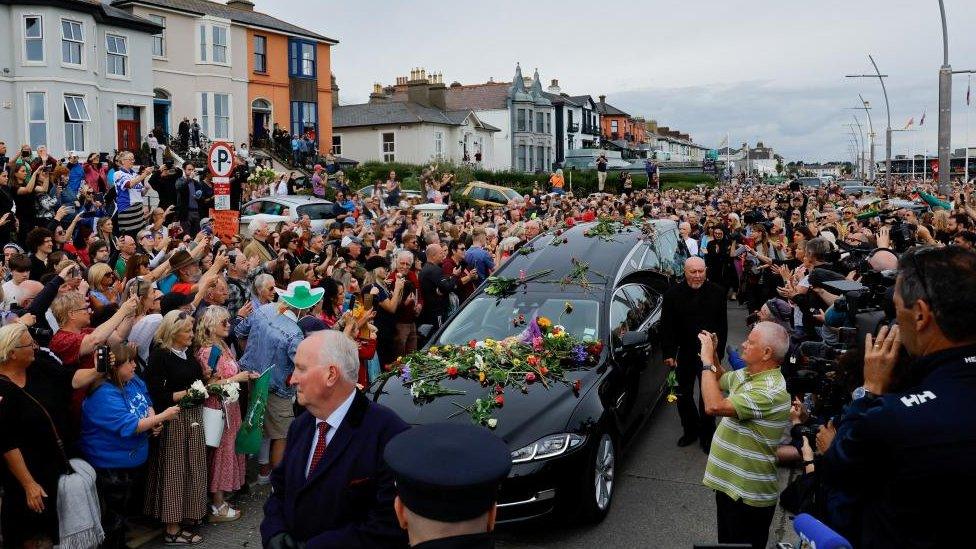Newspaper headlines: 'Double data breach' and 'jabs could beat obesity'
- Published


PSNI Assistant Chief Constable Chris Todd speaks to the media about a data breach involving staff details
A variety of stories lead Wednesday's papers.
Two data breaches revealed on Tuesday - at the Police Service of Northern Ireland and the Electoral Commission - make the front of the Daily Mail. The paper says more than 40 million people could have had their details taken from the Commission, and quotes the Police Federation as saying the PSNI breach, which exposed the names of the force's entire staff, is of "monumental proportions". The Mail says both breaches "defy belief".
The Daily Telegraph says it can "disclose" that the UK intelligence services have already found evidence linking Russia to the Electoral Commission breach. It also reports that the hack showed signs of ransomware - software blocking users from accessing some files - raising the possibility of the body responsible for elections in the UK being locked out of voter lists ahead of a ballot. The Times says it has been told that evidence of Russian activity "had been detected", though nothing pointed to the Kremlin itself.
The lead story in the Times, though, is the successful trial of a new weight loss drug said to be able to cut heart attacks and strokes by a fifth. It reports that among more than 17,500 overweight people who took part, those given the drug Wegovy were "significantly" less likely to suffer from cardiovascular problems, or die, over the subsequent five years than those on a standard treatment. The trial was carried out by the drug manufacturer itself, Novo Nordisk. The health secretary, Steve Barclay, says Wegovy could be vital in easing pressure on the NHS.
The i devotes its front page to the same story, saying about four million people could be eligible for the drug when it launches on the health service.
According to the Telegraph, analysis by the Taxpayers Alliance - which campaigns for low taxes - suggests that the civil service is promoting many officials to get past a pay-freeze on salaries. It says the number of civil servants earning £100,000 or more has nearly doubled since 2016, while staff in the bottom wage brackets have dropped. The paper points out that there has been a pay freeze on Whitehall since 2021 to bring down civil service costs. The Cabinet Office tells the paper it is committed to efficiency.

Mourners line the streets of Bray, Ireland to pay their respects to late singer Sinéad O'Connor
The Daily Express says a "landmark" deal with Turkey will help Britain stop criminal gangs smuggling people across the Channel. It reports that the agreement will allow more National Crime Agency officers to be deployed in Turkey, seen as a hub for people smugglers. The operation will target supply chains and seize items such as dinghies and life-jackets.
Two tributes dominate the front page of the Daily Mirror: a huge picture of the crowds lining the streets to say farewell to Sinéad O'Connor and a report that the Prince and Princess of Wales will lead proceedings at the first anniversary of the Queen's death next month. The headline reads "In Loving Memory".
The Financial Times reports that Universal Music and Google are in early talks to find a way of licensing musicians' voices and melodies for songs to be generated by AI - as a way of monetising one of the music industry's biggest threats. There's no imminent "product launch", says the FT, but the discussions could pave the way for software to be developed allowing users to create tracks using artists' voices legitimately.

THE CLOUDY FUTURE OF DATA STORAGE: Can remote servers still handle spiralling data demands?
WHAT CAN AI REALLY DO FOR US?: The latest science news, including a look at emerging AI tech'Plan B on Rwanda' as 'MPs defy second jobs anger'
